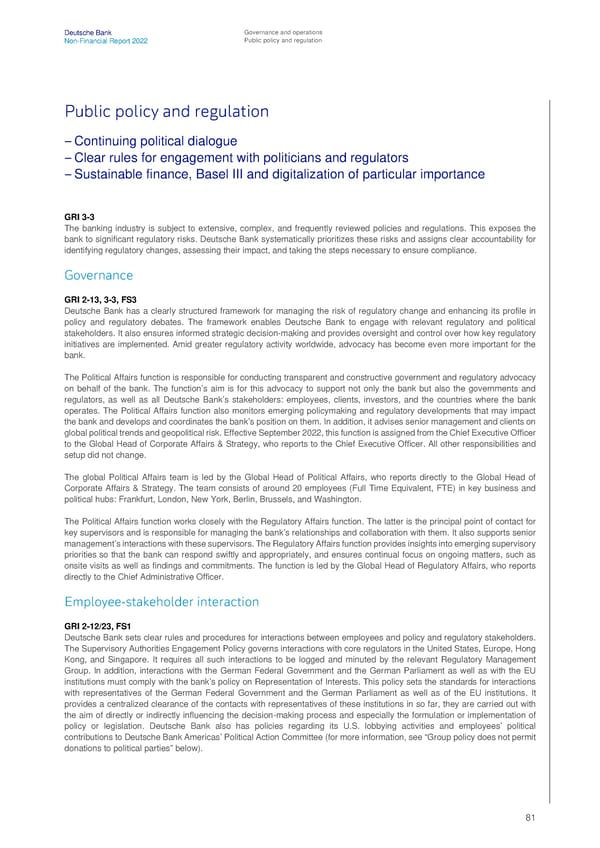Deutsche Bank Governance and operations Non-Financial Report 2022 Public policy and regulation Public policy and regulation – Continuing political dialogue – Clear rules for engagement with politicians and regulators – Sustainable finance, Basel III and digitalization of particular importance GRI 3-3 The banking industry is subject to extensive, complex, and frequently reviewed policies and regulations. This exposes the bank to significant regulatory risks. Deutsche Bank systematically prioritizes these risks and assigns clear accountability for identifying regulatory changes, assessing their impact, and taking the steps necessary to ensure compliance. Governance GRI 2-13, 3-3, FS3 Deutsche Bank has a clearly structured framework for managing the risk of regulatory change and enhancing its profile in policy and regulatory debates. The framework enables Deutsche Bank to engage with relevant regulatory and political stakeholders. It also ensures informed strategic decision-making and provides oversight and control over how key regulatory initiatives are implemented. Amid greater regulatory activity worldwide, advocacy has become even more important for the bank. The Political Affairs function is responsible for conducting transparent and constructive government and regulatory advocacy on behalf of the bank. The function’s aim is for this advocacy to support not only the bank but also the governments and regulators, as well as all Deutsche Bank’s stakeholders: employees, clients, investors, and the countries where the bank operates. The Political Affairs function also monitors emerging policymaking and regulatory developments that may impact the bank and develops and coordinates the bank’s position on them. In addition, it advises senior management and clients on global political trends and geopolitical risk. Effective September 2022, this function is assigned from the Chief Executive Officer to the Global Head of Corporate Affairs & Strategy, who reports to the Chief Executive Officer. All other responsibilities and setup did not change. The global Political Affairs team is led by the Global Head of Political Affairs, who reports directly to the Global Head of Corporate Affairs & Strategy. The team consists of around 20 employees (Full Time Equivalent, FTE) in key business and political hubs: Frankfurt, London, New York, Berlin, Brussels, and Washington. The Political Affairs function works closely with the Regulatory Affairs function. The latter is the principal point of contact for key supervisors and is responsible for managing the bank’s relationships and collaboration with them. It also supports senior management’s interactions with these supervisors. The Regulatory Affairs function provides insights into emerging supervisory priorities so that the bank can respond swiftly and appropriately, and ensures continual focus on ongoing matters, such as onsite visits as well as findings and commitments. The function is led by the Global Head of Regulatory Affairs, who reports directly to the Chief Administrative Officer. Employee-stakeholder interaction GRI 2-12/23, FS1 Deutsche Bank sets clear rules and procedures for interactions between employees and policy and regulatory stakeholders. The Supervisory Authorities Engagement Policy governs interactions with core regulators in the United States, Europe, Hong Kong, and Singapore. It requires all such interactions to be logged and minuted by the relevant Regulatory Management Group. In addition, interactions with the German Federal Government and the German Parliament as well as with the EU institutions must comply with the bank’s policy on Representation of Interests. This policy sets the standards for interactions with representatives of the German Federal Government and the German Parliament as well as of the EU institutions. It provides a centralized clearance of the contacts with representatives of these institutions in so far, they are carried out with the aim of directly or indirectly influencing the decision-making process and especially the formulation or implementation of policy or legislation. Deutsche Bank also has policies regarding its U.S. lobbying activities and employees’ political contributions to Deutsche Bank Americas’ Political Action Committee (for more information, see “Group policy does not permit donations to political parties” below). 81
 Deutsche Bank Non Financial Report Page 81 Page 83
Deutsche Bank Non Financial Report Page 81 Page 83